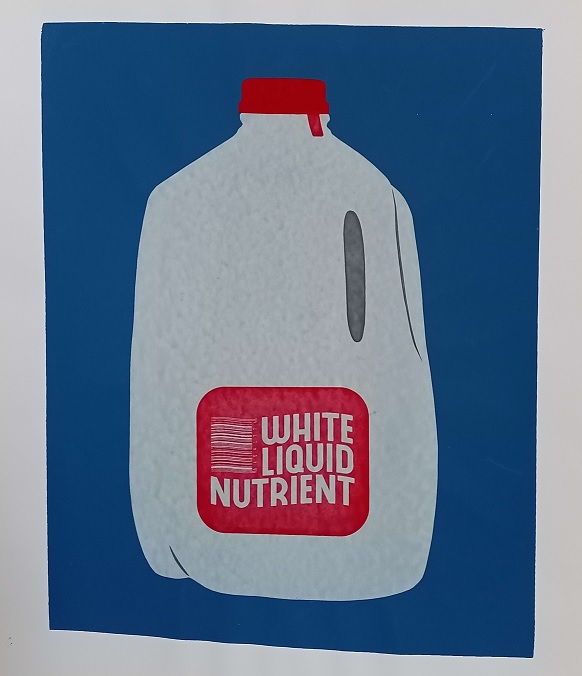- cross-posted to:
- science@lemmy.ml
- cross-posted to:
- science@lemmy.ml
Remember those stupid people in the past, drinking lead-poisoned water? At least we could just stop using lead in pipes when we found out it’s bad for us. Good luck finding anything to ingest without microplastics.
My thought exactly: it’s essentially impossible to avoid micro plastic ingestion. I have no idea how one would go about removing plastic packaging from their food supply as it’s used to package basically everything.
Small steps. I replaced my mixing bowls with stainless steel, my food storage containers that take anything warm with glass, and my drinking cup with an SS one as well. At the very least, everything looks cooler now ;)
deleted by creator
I’ll never stop using SS for stainless steel or screenshots. At least as long as I’m not writing German ;)
Americans are so funny, because literally everything has to have an abbreviation.
Woah there, did you just call me American?
You can interpret it that way, if you want. However, that wasn’t really what I had in mind. Just pointing out that Americans seem to love acronyms so much that it gets completely ridiculous at times. In highly technical contexts it makes sense when you’re writing documentation or articles for a very small audience.
For instance, you can shorten Green House Gasses to GHGs if you’re audience consists of climate scientists, but don’t expect the general public to know that acronym. Go ahead and shorten Volatile Organic Compounds to VOCs if you’re writing to chemists. You can talk about CMB when talking to geologists and FFPs when talking to cosmologists, but people outside those fiels probably have never heard of these things let alone the acronyms.
In normal every day situations it just doesn’t make sense, because you can’t realistically expect everyone to know all of these thousands of accornyms for thousands of more or less common items, situations and things in life.
So, like using SS only after having used stainless steel directly and still being in the same context?
! What’s wrong with Solidus Snake?
CQC your local Nazi
These guys are getting more and more open about it.
Why? We must eradicate the microplastics! Who knows, maybe we can put all those neo-Nazis coming to prominence to good use.
As a person with a medical condition that makes it hard for me to lift things, moving away from plastic really sucks. ☹️
Yeah, I’m pessimistic about the huge shift we’d need to make, especially in America. But so much of that packaging is completely unnecessary. Glass jars instead of plastic tubs or bottles. If you visit some places in the UK, they don’t give you single use plastics in hotels and restaurants, though you can still buy that stuff in stores. Water is bottled in glass. Continental breakfast jams are in tiny glass jars. Some snack packages come in waxed paper bags, like what some tortilla chip brands are packaged in here in the US. Paperboard, cardboard, tins and foil. For toiletries, come countries have stores focused on sustainability where you bring your own reusable containers and they have dispensers for things like shampoo and liquid soap. Like a…soda fountain, but for cleaning products.
People are just so opposed to it here. Like aggressively opposed it it. Like eating yogurt in a glass jar instead of plastic is offensive to them. I don’t get it.
Removed by mod
It’s actually not used everywhere: Cellophane is quite common as its permeable to water vapour but pretty much only that. Bio-sourced (cellulose) and compostable and you’re free to throw it in paper recycling as they’re used to fishing it out of the sludge (it’s what transparent letter windows are made of). And compostable here means in your own backyard, no industrial high-temperature composting needed.
Many plastics can’t readily be replaced but cellulose and lignin based stuff is at a stage where it can fill many many roles.
Also don’t forget metal, especially stainless steel. Glass if you want to look inside. All that will need regulation as currently producers are happily externalising costs.
Now if someone would produce stailness containers that are on the same performance and general engineering level as lock&lock.
We still have lead pipes in a number of places… its not like we snapped our fingers and all the lead pipes were magically gone.
What I heard is that we have such hard¹ water where I live (ancient city center), to protect against lead. No idea if that’s an urban legend or not.
¹17 dH, 3.036 mmol/l, 6.071 mval/l,21.303 °e
This is true. Hard water reduces the amount of lead that can leach into water. I don’t know the specific concentrations etc, but it is true.
I know it’s true, I just don’t know if it’s true that that’s why we have such hard water (that I need to filter with Brita plastic filters …)
Do water filters filter out microplastics? Although if they did i’m not too sure of the effectiveness, aside from removing maybe unsafe quantities… mainly because most filter jugs are usually made out of plastic
I doubt it, I was more referring to me using plastic boxes to filter my water.
Fun fact, when romans introduced lead pipes through aqueducts across the empire, the lead didn’t affect all populations equally because of this. Hard water regions were mostly spared. Turns out the layer of limescale that forms on pipes is also good at stopping the lead leaching.
That’s true. I meant we stopped actively using them when building new houses. Though now that I think about it, even that is maybe not true everywhere. But at least it’s something you could change once you identify the problem. Microplastics have permeated everything, they can be found in the depths of the Mariana Trench. There is no getting rid of them (as far as we know).
Sure there is.
Its just not economically viable (meaning it won’t make anyone more money than not doing it), so its not going to happen anytime soon.
Not trying to be combative, but genuinely curious: What ways are there to remove microplastics from organisms?
Blend it up nicely and put it in a high speed centrifuge?
But seriously, replacing the organism tissue by tissue with clean replacements is about the most survivable option we’ve got right now.
We’ve found some DNA that codes enzymes that break down certain types, and we’re starting to crack protein folding. So maybe we could adapt them to play nice in humans and come up with a regiment, but we’re not nearly there yet
Thank you!
All atoms in the biosphere cycle regularly aside from some very longstanding ones.
If you identify the chemical makeup of the monomer (corroded plastic, micro plastic, whatever you want to call it), there’s nothing stopping you from hypothetically finding or creating enzymes which can digest it. The only reason it hasn’t happened naturally yet is due to a lack of evolutionary pressure to digest the weird compounds we’ve been making up until now.
Set up farms of modified mycelium or bacteria to scrub the plastics, and stop using many or set up required end of life treatment for plastic manufacturers, and you’ll very rapidly make a dent in plastic spread.
Further, modify wild biota, such as mushrooms, bacteria, etc to have the ability to produce the same enzymes for assisting in cleanup.
Big project, yes, but technically feasible. We’ve done more extreme things.
Thanks! So at least there is some hope.
I think there are some naturally evolved bacteria, that digest plastics. Pretty sure I’ve read an article mentioning something like that.
Here it is: https://www.sciencedaily.com/releases/2023/01/230123083443.htm
Nice yeah. Not surprising, different mushrooms have different capacities to digest plastics as well, since mushrooms just kind if have all sorts of crazy stuff going on to let them do that.
I’d just point out that these microorganisms will definitely escape into the wild at some point and then durabilty for plastics will be similar (maybe?) to that for wood (there was also a period in time when trees evolved when microorganisms had to catch up to degrade it, presumably it was full of wood everywhere that just wasn’t rotting).
Imagine a future where your PC screen or mobile phone has an expiry date and it’s not due to planned obsolescence. Maybe that’s not so bad after all, now that I think about it.
Well I recommended modification of wild biota anyway so yeah, that’s the idea.
I live in a 70 year old wood framed house with a 20 year old wooden desk, walk on 30 year old wooden floors, have 15 year old wooden doors…
Meanwhile I’d easily wager 80% or more of plastics have a dwell time once deployed of a few days.
In reality, without being in relatively harsh conditions, it’s unlikely for plastics to degrade very quickly even with highly effective digestion.
What ways are there to remove lead or damage caused lead from organisms?
I don’t know. Can the lead levels in plants and meat even be high enough to be dangerous for humans?
I assumed removing the lead pipes would be enough for lead while you had to remove the microplastics from every plant and animal you want to eat. But I realise I may be completely wrong.
In fact, the US government is giving out grants to states right now to help them remove lead pipes.
Lead is still everywhere. Many electrical cords, Christmas decorations, paint remaining in homes from the 60s and before, even the 70s and possibly 80s. Many tools still sold today, screwdrivers, drill bits, etc. Many fresh produce foods have the potential and often do contain unsafe levels of lead, yes, stuff you buy at the grocery store. Some spices. Stained glass windows. Paints on cheap Chinese or elsewhere toys and other goods. People get lead poisoning today just from living their life not realizing normal stuff around them is dangerous. For real.
You know what also has it? Cheap silverware. You can literally rub it off with a terry cloth if you rub the utensil for like a minute straight… a friend of mine showed me one day. It leaves a shimmering powder on the cloth…
Never ever skimp out on silverware…
Most of the lead-filled silverware comes from China, too…
How scary…
We literally replaced lead pipes with plastic pipes
Not exclusively plastic.
Yeah, mine are copper
I’m not saying any of this is untrue, I’m saying consider the domain name of your news source too.
It’s not like they don’t link the study ;)
Interesting read, I guess testing on mice is all you can do the behavioral part. But the methods section doesn’t state any weaknesses, I know it’s nor required but you know.
At the end of the 3-week-long exposure, behavioral testing began. During the open-field test, mice were allowed to explore a low-lit chamber for 90 min with spontaneous movements monitored in the x-, y-, and z-directions. Several parameters to measure behavioral performance were recorded, including distance traveled, rearing activity, and duration in the center. Surprisingly, we found that acute exposure to PS-MPs induced an increase in distance traveled, which was more pronounced in older animals (Figure 3A–D). Similarly, both young and old PS-MP-exposed mice reared significantly more in the open-field, as compared to age-matched controls (Figure 3E–H). Young PS-MP-exposed mice did not spend more time in the center of the chamber overall (Figure 3J), but both low- and high-dose groups spent more time in the center when analyzed as a function of time (Figure 3I). Low- and medium-dose older animals also showed an increased duration in the center (Figure 3K,L).
I share your concerns regarding the domain name (alleviated by linked study) and methods.
I’d just like to add that, at least for me, the alarming part is regarding the distribution of these, they seem to be not only lipophillic (which would be expected, considering the nature of them), but also able to cross the blood-brain barrier, something evolved in order to keep bad stuff out (sure, the lipophillic nature explains that part as well, but presumably the fact that they are undissolved but basically very small particles, there was probably some hope towards them not being able to cross).
To me, this raises some questions regarding what else travels with them, and are they inadvertently becoming a vector for stuff that would normally be more easily disposed of? Thinking of things like the first pass effect here, in the liver where things like ‘naked’ pollutants would be processed/eliminated ‘on sight’; then, if something comes along adsorbed/absorbed into a 3D structure that hides it from the body long enough and then reaches the brain, that something could be potentially leached in a highly unfortunate place. Think targetted drug delivery - only random and with whatever happened to be around while the microplastic was forming.
Add to this the fact that any and all studies lack a control group since the things are in everything and everyone. Would it even be possible to grow plastic-free lab animals to test them? How would you even isolate the area without using any sort of plastic?
I predict that behavioral studies are more likely than not to show erratic results due to having different baselines of comparison for each subject because of the heterogeneity of contamination, so even spiking with the same agent in the same manner, you’d be either compounding an effect, potentially countering another or perhaps just eliciting a totally different response. How would one control for that? Maybe get as uniform a starting group as possible but how would you prove that uniformity?
Well that’s absolutely horrifying.
If it makes you feel any better, it’s so large a problem that you’re likely utterly powerless to stop it.
You’re not wrong, but now that I’ve read this article I’m pretty sure I can feel the microplastics inflaming my brain.
Good news: If this keeps up you won’t remember why you can feel the microplastics in your brain 👍
That’s why I chose to ignore it. What am I gonna do about it
Push your local politicians to take steps in the right direction.
Whatever it takes to get governments to listen.
Violence
I wonder if micro plastics will be our generation’s lead.
Hopefully not as damaging…?
It may be the next 100 generations’ lead.
Zero chance humanity survives on Earth that long.
MIT still holds that global society will disintegrate by 2040.
Hell, the U.S. is going to be lucky to make it through the next presidential election.
Removed by mod
deleted by creator
Removed by mod
deleted by creator
What have you done to assist with fixing this?
Based
Doubt it, men will become impotent by then. Testosterone levels are already halved compared to only a few decades ago
Nice, now show me a reliable source that has it 0ing out.
Hopefully not as damaging…?
Ha, maybe not directly but as ubiquitous as it is, we’re completely fucked. It’s everywhere and not going away. The damage has already been done, we’re just starting to examine to what extent.
Them and chemicals in general.
Especially dihydrogenmonoxide!
I hate that we keep running these massive experiments on ourselves.
There should be limited territories where people can go to use whatever new material they want, if they correctly capture and prevent the airborne spread of things. But otherwise civilization should remain within the boundaries of tried and true sustainable methods.
Revenge of the dinosaurs
You mean revenge of the plankton?
Removed by mod
I literally had the exact same thought…
I often see articles about the effects of microplastics, but I have yet to see or read about the best steps we can take to combat them.
Can anyone recommend some content that describes ways to reduce exposure or share the most effective ways there are of reducing microplastic exposure?
Don’t heat food in plastic in the microwave. Put in the effort to put it in glass or a plate or so, then heat.
Don’t store hot leftovers in plastic.
Don’t buy and drink plastic bottled water.
If you can in the stores in general chose between food and drinks packaged in glass or cardboard vs anything else: chances are glass or cardboard packaging is the healthier choice. Aluminum cans should still be okayish too, tho they possibly layered it with plastic inside too depending on the pH of the contents to slow down reactions between can and product.
There is no living creature and no source of water without microplastics in it. Newborns have it in their blood and ground water has concentrations of it.
yes, that is correct. I never said it would bring your intake to zero. But those appear to be big ways of microplastic intake we can control: food+packaging and food+heat. Harder to control the air you breathe in the city…
Oh i know you weren’t looking for zero, but reduction and end-user changes won’t fix the issue any more than a bandage on a leaking tire in a flood. It’s just like other pollution issues, it has to be cut off or regulated at the source.
Don’t reuse plastic that isn’t rated for repeated use
Is it really rated for micro plastics? Or is it rated for chemical leeching?
Seems you can easily accidentally scrape off micro pieces of plastic from any container I assume is intended for reuse or food storage.
Ban plastic. There is literally no other way. Nothing you do on an individual level will have the slightest bit of impact at all. Government has to treat plastic like Freon/DDT or any other chemical that was banned world-wide because of huge unexpected impact.
They can’t ban literally all plastic; it’s irreplaceable in some medical applications.
It’s irreplaceable in a lot of applications. There’s a reason we’re using so much of it. Even in applications where it can be replaced, doing so would result in burning more fuel to transport the other, heavier material, accelerating global warming. Lose-lose.
It’s also likely an uneccessary nuclear response to the situation. I doubt every plastic is as bad, do studies and ban the worst/least useful plastics and work your way from there.
I mean synthetic textiles alone make up almost half of the plastic in the ocean.
Use natural fiber clothing only, no polyester, just cotton or whatever other natural fibers. Try to use less packaged food. But one of the major sources of microplastics is tire wear from vehicles, not sure what can be done about from a personal level other than not drive, which, I mean, who’s really gonna do that?
Fuckcars would like to have a word with you about that last thing
Of course they will, but the simple fact of the matter is that it is not possible or reasonable to get by without a car in most places in the US. Elsewhere in the world, maybe. Cities, maybe. But not most of the US.
Most of the US population lives in cities, just like in any other industrialised country.
Wait do we have a fuckcars now? Link please!
we have two: !fuck_cars@lemmy.ml and !fuckcars@lemmy.world
Most societies actually got around perfectly fine for most of history without driving. It’s really only in the past seventy years or so that urban planners brains collectively escaped their heads and started designing cities where it’s impossible to do anything without exploding some old dinosaur goo in a giant expensive death machine.
They also didn’t often travel very far.
Because their cities were designed in sensible ways where that wasn’t necessary.
Parts of the country are still halfway reasonable. I’m in Manhattan, and can walk twenty minutes to Penn Station, where I can hop on a train and be in downtown Philadelphia in under two hours. I can get to most places in NYC by subway faster than you could drive there. A train to the airport can get me anywhere in the world.
None of this requires a car, and air travel aside, this was how most of the developed world was set up for the past several hundred years.
tire wear from vehicles, not sure what can be done about from a personal level
One more reason to wear a well-fitted respirator
I would fucking love to not drive. Just don’t take away my fitnesswear.
Unfortunately, all of the best fitness wear is polyester or otherwise plastic based. And it’s so far superior to the alternatives that there is no switching away from it.
I just remembered there are some great products made of bamboo, wool, or hemp! Yah, the vast majority of great products are plastic. Perhaps one day we’ll have like a scale or way to know if basically the product lasts or if it will shed a lot of plastic. That way we could switch to great plastic rather than stop using it entirely. Oof.
deleted by creator
Let me think. Ah: We could actually solve two problems at once, microplastics and rolling resistance, by using steel wheels on steel streets. Make a street lane two beams of steel, that saves on material, and the wheels conical so that they follow those beams automatically, replacing the car’s differential. In case we need more grip we can spray sand, though as the street is now steel we can also use magnets for breaking. I should patent that!
Hmm, interesting regarding them coming from vehicles. As far as microplastics from clothing, does anyone know if they are absorbed through the skin? I would think they would only readily be absorded thought food and water intake, but I am just surmising.
Apparently, they are mostly absorbed from drinking water and inhalation in relatively equal amounts according to science direct.
Mostly clothes form microplastics during cleaning which end up in the waterways.
You breathe in the microscopic particles created from abrasion.
No polyester is difficult 😭 do you know if there any other natural fibers somewhat comparable or breathable, for cycling etc.?
No driving is easy for me right now - my car has two wheels and I’m the engine 🚲🤪
Not driving isn’t an option in my area. Not if you want to be employed.
Its a 30 minute drive to the bus stop to get to work. Plus travel time along bus stops.
Its a 35 minute drive to the front door.
If its still half an hour to just get to the bus stop, what’s the point even, at a personal level?
Captain Planet told me in the 90s what was gonna happen. Corporations just took it as a play book to accelerate shit.
The two largest sources of microplastics are clothing and car tires. Clothing is a pretty easy fix. Only buy natural fibers like cotton, wool, etc. For car tires you will have to drive less. These two sources account for more than half of microplastics.
Natural fibers are often outside the price range of the average person. Until prices come down or wages go up, people will keep wearing polyester clothing.
For tires, I’m hopeful that technology will improve the composition of tires, or even make them out of a modified form of natural rubber, but switching most transport to rail seems like the superior option here.
??? Cotton is usually the cheapest thing I see.
Even natural rubber makes microplastics.
Companies love to charge a premium for cotton here (Canada). I try to get Cotton, Linen and Hemp as much as possible, but I end up paying $80 for a t-shirt instead of $30.
Carbon tax
This generation’s Leaded Gasoline.
Many, many future generation’s leaded gasoline aswell. You’re welcome, future generations! We thought, we’d add a little something to the mix to take your mind of the climate disaster.
It’s worse unfortunately. Even if we stopped using plastic materials today the effects from this will carry on for many generations. Fortunately, I’m confident we will also find ways to mitigate the issue over time as well, but it’s a far greater challenge than lead. Perhaps as a positive the symptoms might not be akin to the violent behavior lead caused around the world. We shall see.
I’m imagining a world where humans live under the spell of microplastics like leaf cutter ants are hypnotized by fungus.
Oh wait, we already needlessly dig up fossil fuels for the plastic overlords despite all better judgment
Praise be the Oil God, Exxon.
Fuck you heathens. Only Shell is the one true Lord!!
B.utt P.lug for life!!!
more oil for the oil god. more coal for the coal throne.
deleted by creator
Holy WD 40k*
deleted by creator
Sacrifice humans to the sacred alter of Exxon
The oil must flow!
Plastics are into everything. Good luck getting that dirt bag lobby out of Congress.
Unfortunately by now even the Congressmen are plastic.
Always have been
Maybe the cotton industry could help, like they did with cannabis?
Microplastics are in breast milk too. Our babies aren’t safe from it either.
https://www.theguardian.com/environment/2022/oct/07/microplastics-human-breast-milk-first-time
Maybe if ladies stop putting microplastics in their boobs?
Many of them pay to put macroplastics in their boobs, so not very likely.
Silicone is not actually plastic and definitely don’t break down into microplastics (if they break down at all). There’s varieties leeching suspicious stuff but for some applications the nice ones might actually be the solution of the future, say, for seals for glass jars and stuff. Rubber isn’t better just because it grows on trees, rubber tyres are one of the main sources of microplastics.
sigh…
Tires haven’t been rubber since the 50’s. Current tires are definitely a leading source of microplastics, but it is incorrect, and misleading to group rubber from trees in with microplastics.
Yes in the sense that there’s synthetic rubber which generates less microplastics.
Previous studies have suggested that GFAP expression might decrease in early stages of some neurodegenerative diseases, such as Alzheimer’s disease, or in younger patients with depression disorders.
So Alzheimer’s or depression, eh? So if I have chronic depression am I safe from Alzheimer’s or am I going to be depressed and constantly forgetting my medication?
Yes.
You aren’t safe from the chronic depression, it’ll get ya.
This generation’s leaded gasoline, then. Wonderful.
deleted by creator
Nice, a new Zombie-plot.
MDPI has a history of accepting whatever. Not saying it’s bad research but nobody knows for certain.
I’m absolutely not surprised.

























